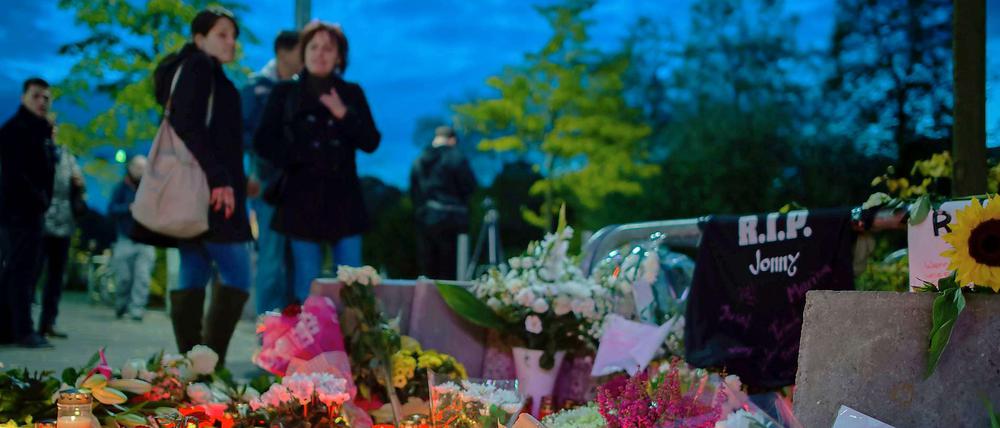
© dapd
Espiner's Berlin: Berlin Alexanderplatz: my home that belongs to us all
A shocking murder and a shrine of remembrance on Alexanderplatz sets Mark Espiner thinking whether London's urban violence is Berlin's latest import.
Three years after the 7/7 terrorist bombings and in the middle of the financial crisis, I decided to leave London. In 2008, the city seemed to have sunk irreversibly into a spiral of paranoia and violence. Roadside shrines blooming with cut flowers and poignant portraits to teenage stabbing victims seemed to pop up every week. Their frequency didn’t make them any less shocking. And when my 11-year-old stepdaughter saw teenagers on the bus tormenting a kid with a cigarette lighter, I began to wonder whether London was the city I really wanted to carry on living in.
In Berlin, I think you still have to imagine what such a climate of urban violence can do to you, how it can change the way you behave. You make sure you don’t intervene in any public dispute in case it could flare up into a violent confrontation. You make sure you don’t meet anyone’s eye who could perceive it as a threat, and you avoid cycling through areas – even if they look like lovely riverside bike paths - where groups of youth watch their weapon dogs fight each other, or where you have heard that others like you have been pelted with stones, or pushed off their bikes.
Some of the counter measures that come with this don’t offer solutions either: bristling bushes of CCTVs on every corner, which only seem to justify devolving more social responsibility to the authorities and, according to some reports, have little effect on reducing crime anyway.
In comparison to that violent face of London, Berlin Alexanderplatz was like an oasis of urban calm to me when I arrived here. The TV tower, the central pin of the city, and the concrete architecture seemed to encapsulate both the future and the past. It was an odd square. Empty, but open. It embraced many of the city’s tribes: the brightly coloured techno dancers, the leather trenchcoated goths, the tourists, the drunks, and of course the punks. For three years now, I’ve lived right on the square. It’s my home. When I moved in there was no hint of a surveillance camera and no sense of a threat. Despite the recent appaling events, it still feels like that to me.
I’ve always felt safe at any time of the day or night here. So I was surprised when recently one of my ex-GDR neighbours said that since the wall came down they have never dared to go unaccompanied across the square at night, that Alexanderplatz is going, quite literally, to the dogs.
Having said all that, something has happened in Alexanderplatz in recent months. There is an edge, and I think I know why. As Rudi Giuliani proved in NYC, keeping a place presentable prevents crime. Could it be that the chaotic and seemingly interminable building sites are promoting antisocial behaviour? Since the construction began on no less than three separate projects - what kind of spectacularly insensitive planning is that? - the square has been open ground for abuse. Tagging, that worst and most egocentric kind of graffiti has suddenly appeared on the TV tower’s base, and parts of the platz are used as an open toilet.
I get a little bit defensive when people start talking Alexanderplatz down. Partly because I live here. Partly because it’s nothing like my old Camden kiez with its crack battles or 381 violent incidents a month. But mostly because I’m optimistic about the fantastic opportunity there is to make something of this unique and huge open space right in the city centre. When the work is done, and as is already in evidence on the Karl Liebknecht side where people are using the benches and green grass banks to sit and pass the time, Alexanderplatz could become a great social hub, a grand European square where you can pause and spend time rather than simply passing through it to get to the station (if you’re a citizen) or to the museum island (if you’re a tourist).
When I came back to Berlin late on Tuesday night this week, after being away, and saw the flickering candles and touching messages to Jonny, my spirits sank. My heart goes out to his family and friends. I had a flashback to those London stabbing shrines and wondered if they would start popping up in Berlin. Were there more to come? But then I saw a tramp carefully tidying the flowers and relighting the candles that had been blown out in wind. It was a touching gesture. And one echoed by the many people of all ages and races I’ve seen since paying their respects and bringing flowers. It won’t bring Jonny back, but it’s a sign of hope, that Alexanderplatz isn’t a place for murder and violence - it’s a public space that belongs to us all.
- showPaywall:
- false
- isSubscriber:
- false
- isPaid:
- showPaywallPiano:
- false